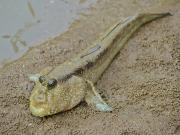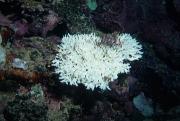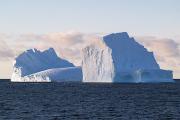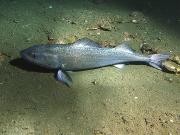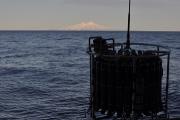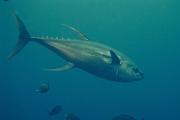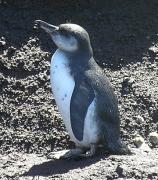Radio Program
Our regular Science and the SeaTM radio program presents marine science topics in an engaging two-minute story format. Our script writers gather ideas for the radio program from the University of Texas Marine Science Institute's researchers and from our very popular college class, Introduction to Oceanography, which we teach to hundreds of non-science majors at The University of Texas at Austin every year. Our radio programs are distributed at to commercial and public radio stations across the country.
For most fish, there’s one way to breathe. The fish takes in water through its mouth and passes it over its gills. Tiny blood vessels in the gills absorb oxygen from the water and send it through the fish’s body. If the fish leaves the water for more than a few minutes, it suffocates—it can’t breathe oxygen from the air.
Warming oceans have damaged or destroyed many coral reefs. But some appear to be adapting to the warm-up. Reef systems in a part of the central Pacific Ocean, for example, have suffered less damage from a couple of recent underwater heatwaves than from an earlier one. That could mean that coral offspring that are more resistant to heat are taking hold.
If you’re lounging in the Florida Keys one day and you see an iceberg drifting by, you might think you’ve had one too many margaritas. But a recent study says giant icebergs did make it to the Keys thousands of years ago—the result of massive flooding thousands of miles away.
A fish known as black cod has become a lot more popular in recent years. It has a buttery texture and flavor, and it contains a lot of healthy omega-3 fatty acids. And federal agencies say it’s sustainable—current populations and fishing regulations mean it’s not in danger of disappearing.
Scientists learn a lot about the oceans by measuring a pinch of this and a smidge of that. These tiny amounts can help trace ocean currents, determine the abundance of microscopic life, measure pollution, plot past changes in the climate, and find out how the current climate is changing.
Scientists are learning all of that and more from Geotraces, an international program that samples the water from all the oceans. Since the start of the program in 2010, scientists from about 35 countries have logged tens of thousands of miles in research cruises.
When the clouds begin to thicken up, many of us head for cover. And small marine organisms may do the same thing. Some recent research found that they move up or down as cloud cover changes—a way to keep safe as the amount of light changes.
For fans of sushi, sashimi, and tuna steaks on the grill, we have some good news. Four species of tuna have rebounded in recent years, lowering the threat of extinction.
Only one species of penguin lives north of the equator—and it’s nowhere near the North Pole. Instead, it inhabits the warm, sunny Galapagos Islands, off the coast of South America. But it’s endangered—its population has dwindled to just a couple of thousand.
To borrow an old phrase, everything old is new again. Consider life in the Arctic Ocean. As the ocean warmed up after the last Ice Age, it was divided into several layers. The layering made life hard for the smallest members of the marine food chain. And with the Arctic growing warmer now, the same thing could happen again. That could limit not only microscopic life, but larger organisms as well.
A volcano responsible for one of the most powerful eruptions of the last 10,000 years may be settling in for a nap—the result of higher sea levels.

